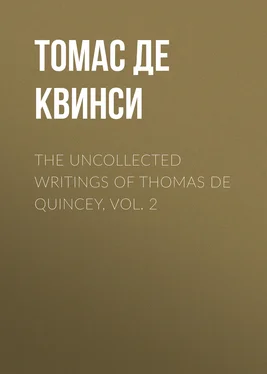Томас Де Квинси - The Uncollected Writings of Thomas de Quincey, Vol. 2
Здесь есть возможность читать онлайн «Томас Де Квинси - The Uncollected Writings of Thomas de Quincey, Vol. 2» — ознакомительный отрывок электронной книги совершенно бесплатно, а после прочтения отрывка купить полную версию. В некоторых случаях можно слушать аудио, скачать через торрент в формате fb2 и присутствует краткое содержание. Жанр: foreign_prose, literature_19, foreign_antique, на английском языке. Описание произведения, (предисловие) а так же отзывы посетителей доступны на портале библиотеки ЛибКат.
- Название:The Uncollected Writings of Thomas de Quincey, Vol. 2
- Автор:
- Жанр:
- Год:неизвестен
- ISBN:нет данных
- Рейтинг книги:3 / 5. Голосов: 1
-
Избранное:Добавить в избранное
- Отзывы:
-
Ваша оценка:
- 60
- 1
- 2
- 3
- 4
- 5
The Uncollected Writings of Thomas de Quincey, Vol. 2: краткое содержание, описание и аннотация
Предлагаем к чтению аннотацию, описание, краткое содержание или предисловие (зависит от того, что написал сам автор книги «The Uncollected Writings of Thomas de Quincey, Vol. 2»). Если вы не нашли необходимую информацию о книге — напишите в комментариях, мы постараемся отыскать её.
The Uncollected Writings of Thomas de Quincey, Vol. 2 — читать онлайн ознакомительный отрывок
Ниже представлен текст книги, разбитый по страницам. Система сохранения места последней прочитанной страницы, позволяет с удобством читать онлайн бесплатно книгу «The Uncollected Writings of Thomas de Quincey, Vol. 2», без необходимости каждый раз заново искать на чём Вы остановились. Поставьте закладку, и сможете в любой момент перейти на страницу, на которой закончили чтение.
Интервал:
Закладка:
CONDUCT OF THE WAR
Such is the condition of that guilty town, nearest of all Chinese towns to Hong-Kong, and indissolubly connected with ourselves. From this town it is that the insults to our flag, and the attempts at poisoning, wholesale and retail, have collectively emanated; and all under the original impulse of Yeh. Surely, in speculating on the conduct of the war, either as probable or as reasonable, the old oracular sentence of Cato the Elder and of the Roman senate ( Delenda est Carthago ) begins to murmur in our ears—not in this stern form, but in some modification, better suited to a merciful religion and to our western civilization. It is a great neglect on the part of somebody, that we have no account of the baker's trial at Hong-Kong. He was acquitted, it seems; but upon what ground? Some journals told us that he represented Yeh as coercing him into this vile attempt, through his natural affection for his family, alleged to be in Yeh's power at Canton. Such a fact, if true, would furnish some doubtful palliation of the baker's crime, and might have weight allowed in the sentence; but surely it would place a most dangerous power in the hands of Chinese grandees, if, through the leverage of families within their grasp, and by official connivance on our part, they could reach and govern a set of agents in Hong-Kong. No sympathy with our horror of secret murders by poison, under the shelter of household opportunities, must be counted on from the emperor, for he has himself largely encouraged, rewarded, and decorated these claims on his public bounty. The more necessary that such nests of crime as Canton, and such suggestors of crime as Yeh, should be thoroughly disarmed. This could be done, as regards the city, by three changes:—First, by utterly destroying the walls and gates; secondly, by admitting the British to the freest access, and placing their residence in a special quarter, upon the securest footing; thirdly, and as one chief means in that direction, by establishing a police on an English plan, and to some extent English in its composition. As to the cost, it is evident enough that the colonial head-quarters at Hong-Kong must in future keep up a permanent military establishment; and since any danger threatening this colony must be kindled and fed chiefly in Canton, why not make this large city, sole focus as it is of all mischief to us, and not a hundred miles distant from the little island, the main barrack of the armed force?
Upon this world's tariff of international connections, what is China in relation to Great Britain? Free is she, or not—free to dissolve her connection with us? Secondly, what is Great Britain, when commercially appraised, in relation to China? Is she of great value or slight value to China? First, then, concerning China, viewed in its connection with ourselves, this vast (but perhaps not proportionably populous) country offers by accident the same unique advantage for meeting a social hiatus in our British system that is offered by certain southern regions in the American United States for meeting another hiatus within the same British system. Without tea, without cotton, Great Britain, no longer great, would collapse into a very anomalous sort of second-rate power. Without cotton, the main bulwark of our export commerce would depart. And without tea, our daily life would, generally speaking, be as effectually-ruined as bees without a Flora. In both of these cases it happens that the benefit which we receive is unique ; that is, not merely ranking foremost upon a scale of similar benefits reaped from other lands—a largest contribution where others might still be large—but standing alone, and in a solitude that we have always reason to regard as alarming. So that, if Georgia, &c., withdrew from Liverpool and Manchester her myriads of cotton bales, palsied would be our commercial supremacy; and, if childish China should refuse her tea (for as to her silk, that is of secondary importance), we must all go supperless to bed: seriously speaking, the social life of England would receive a deadly wound. It is certainly a phenomenon without a parallel in the history of social man—that a great nation, numbering twenty-five millions, after making an allowance on account of those amongst the very poorest of the Irish who do not use tea, should within one hundred years have found themselves able so absolutely to revolutionise their diet, as to substitute for the gross stimulation of ale and wine the most refined, elegant, and intellectual mode of stimulation that human research has succeeded in discovering. 6 6 Down to George I. there could have been no breakfast in England for a gentleman or lady—there is none even yet in most parts of the Continent—without wine of some class or other.
But the material basis of this stimulation unhappily we draw from the soil of one sole nation—and that nation (are we ever allowed to forget?) capricious and silly beyond all that human experience could else have suggested as possible. In these circumstances, it was not to be supposed that we should neglect any opening that offered for making ourselves independent of a nation which at all times we had so much reason to distrust as the Chinese. Might not the tea-plant be made to prosper in some district of our Indian Empire? Forty years ago we began to put forth organised botanical efforts for settling that question. Forty years ago, and even earlier, according to my remembrance, Dr Roxburgh—in those days the paramount authority upon oriental botany—threw some energy into this experiment for creating our own nurseries of the tea-plant. But not until our Burmese victories, some thirty years since, and our consequent treaties had put the province of Assam into our power, was, I believe, any serious progress made in this important effort. Mr Fortune has since applied the benefits of his scientific knowledge, and the results of his own great personal exertions in the tea districts of China, to the service of this most important speculation; with what success, I am not able to report. Meantime, it is natural to fear that the very possibility of doubts hanging over the results in an experiment so vitally national, carries with it desponding auguries as to the ultimate issue. Were the prospects in any degree cheerful, it would be felt as a patriotic duty to report at short intervals all solid symptoms of progress made in this enterprise; for it is an enterprise aiming at a triumph far more than scientific—a triumph over a secret purpose of the Chinese, full of anti-social malice and insolence against Great Britain. Of late years, as often as we have accomplished a victory over any insult to our national honour offered or meditated by the Chinese, they have recurred to some old historical tradition (perhaps fabulous, perhaps not), of an emperor, Tartar or Chinese, who, rather than submit to terms of equitable reciprocity in commercial dealings with a foreign nation, or to terms implying an original equality of the two peoples, caused the whole establishments and machinery connected with the particular traffic to be destroyed, and all its living agents to be banished or beheaded. It is certain that, in the contemplation of special contingencies likely to occur between themselves and the British, the high mandarins dallied at intervals with this ancient precedent, and forbore to act upon it, partly under the salutary military panic which has for years been gathering gloomily over their heads, but more imperatively, perhaps, from absolute inability to dispense with the weekly proceeds from the customs, so eminently dependent upon the British shipping. Money, mere weight of dollars, the lovely lunar radiance of silver, this was the spell that moonstruck their mercenary hearts, and kept them for ever see-sawing—
'Willing to wound, and yet afraid to strike.'
Интервал:
Закладка:
Похожие книги на «The Uncollected Writings of Thomas de Quincey, Vol. 2»
Представляем Вашему вниманию похожие книги на «The Uncollected Writings of Thomas de Quincey, Vol. 2» списком для выбора. Мы отобрали схожую по названию и смыслу литературу в надежде предоставить читателям больше вариантов отыскать новые, интересные, ещё непрочитанные произведения.
Обсуждение, отзывы о книге «The Uncollected Writings of Thomas de Quincey, Vol. 2» и просто собственные мнения читателей. Оставьте ваши комментарии, напишите, что Вы думаете о произведении, его смысле или главных героях. Укажите что конкретно понравилось, а что нет, и почему Вы так считаете.












